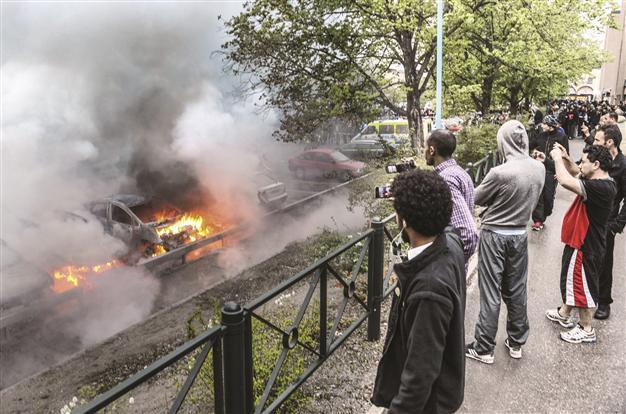Unexpected riots in Sweden raise questions on inequality
HUSBY - The Associated Press

Bystanders take photos of a row of burning cars in Stockholm. AFP photo
Sweden has long been a bastion of generous social welfare and an egalitarian political culture. So many people were shocked when scores of youths hurled rocks at police and set cars ablaze during rioting in several largely immigrant areas near Stockholm this week.
Few dispute that the violence was probably touched off by the fatal police shooting of an elderly man who had locked himself in an apartment wielding a knife. But some residents in the area accused police who responded to the violence of racism.
For some, the real reason for the unrest is the high unemployment and isolation of youths in the southern and western Stockholm suburbs where the violence occurred, ones who see little future for themselves or access to Sweden’s prosperity.
“The segregation in Stockholm increases all the time, and it’s happening fast,” said Nina Edstrom, a social anthropologist who promotes integration at a center for multiculturalism in Fittja, where some of the violence occurred.
“There are very large social differences. There are many unemployed, frustrated young people. I’m not surprised something like this happens,” she said.
Still, Edstrom added, it would be a mistake to see the youths involved in the riots as political activists.
15 percent born abroad
Overall, about 15 percent of Sweden’s 9.5 million people were born abroad, compared to 10 percent 10 years ago. The influx has mostly come from war-torn countries such as Iraq, Somalia, former Yugoslavia, Afghanistan and Syria. In 2012 alone, Sweden accepted 44,000 asylum seekers, up by nearly 50 percent from a year earlier.
The unrest in Fittja and the Husby area is a challenge for the center-right government of Prime Minister Fredrik Reinfeldt, which after seven years in power is trailing in polls and has come under fire for failing to address social problems. The rioting also has added fuel to arguments from the far-right Sweden Democrats party, which polls now show as Sweden’s fourth biggest party.
Some say that one reason such immigrant areas can feel isolating is the growing disparity between the haves and have nots in Sweden, as in many other Western countries.
Despite Sweden’s high living standards and its egalitarian ways, the country has seen the biggest surge in inequality of any Organization for Economic Cooperation and Development country over the past 25 years, according to a recent OECD report.
